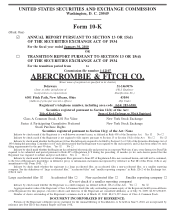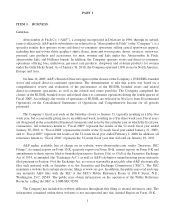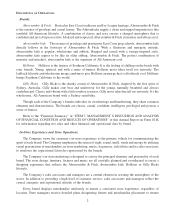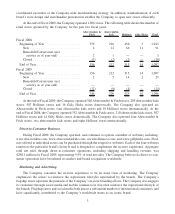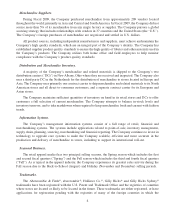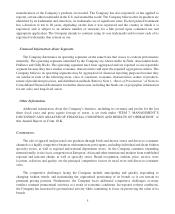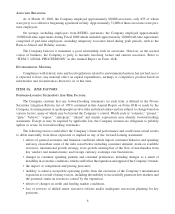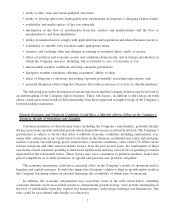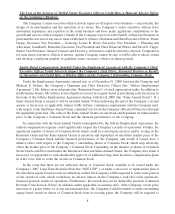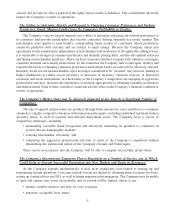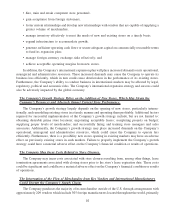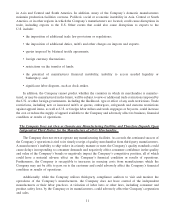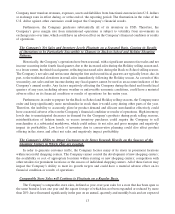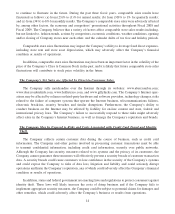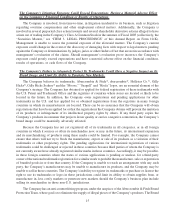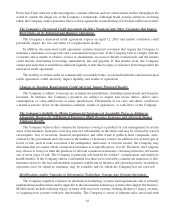Abercrombie & Fitch 2009 Annual Report Download - page 9
Download and view the complete annual report
Please find page 9 of the 2009 Abercrombie & Fitch annual report below. You can navigate through the pages in the report by either clicking on the pages listed below, or by using the keyword search tool below to find specific information within the annual report.
The Loss of the Services of Skilled Senior Executive Officers Could Have a Material Adverse Effect
on the Company’s Business.
The Company’s senior executive officers closely supervise all aspects of its business — in particular, the
design of its merchandise and the operation of its stores. The Company’s senior executive officers have
substantial experience and expertise in the retail business and have made significant contributions to the
growth and success of the Company’s brands. If the Company were to lose the benefit of their involvement, in
particular the services of any one or more of Michael S. Jeffries, Chairman and Chief Executive Officer, Diane
Chang, Executive Vice President — Sourcing, Leslee K. Herro, Executive Vice President — Planning and
Allocation, Jonathan E. Ramsden, Executive Vice President and Chief Financial Officer and David S. Cupps,
Senior Vice President, General Counsel and Secretary, its business could be adversely affected. Competition
for such senior executive officers is intense, and the Company cannot be sure it will be able to attract, retain
and develop a sufficient number of qualified senior executive officers in future periods.
Equity-Based Compensation Awarded Under the Employment Agreement with the Company’s Chief
Executive Officer Could Adversely Impact the Company’s Cash Flows, Financial Position or Results
of Operations and Could Have a Dilutive Effect on the Company’s Outstanding Common Stock.
Under the Employment Agreement, entered into as of December 19, 2008, between the Company and
Michael S. Jeffries, the Company’s Chairman and Chief Executive Officer (the “Jeffries Employment
Agreement”), Mr. Jeffries received grants (the “Retention Grants”) of stock appreciation rights. In addition to
the Retention Grants, Mr. Jeffries is also eligible to receive two equity-based grants during each fiscal year of
the term of the Jeffries Employment Agreement starting with Fiscal 2009 (the “Semi-Annual Grant”). If a
Semi-Annual Grant is earned, it will be awarded within 75 days following the end of the Company’s second
quarter or fiscal year, as applicable, subject to Mr. Jeffries’ continuous employment with the Company (and,
with respect to the final Semi-Annual Grant, continued service on the Company’s Board of Directors) through
the applicable grant date. The value of the Semi-Annual Grants are uncertain and dependent on future market
price of the Company’s Common Stock and the financial performance of the Company.
In connection with the Semi-Annual Grants contemplated by the Jeffries Employment Agreement, the
related compensation expense could significantly impact the Company’s results of operations. Further, the
significant number of shares of Common Stock which could be issued upon exercise and/or vesting of the
Retention Grant and the Semi-Annual Grants is uncertain and dependent on the future market price of the
Company’s Common Stock and the financial performance of the Company, and would, if issued, have a
dilutive effect with respect to the Company’s outstanding shares of Common Stock, which may adversely
affect the market price of the Company’s Common Stock. Depending on the number of shares of Common
Stock which could be issued under the Retention Grant and Semi-Annual Grants, the Company may deem it
necessary or appropriate to seek shareholder approval of additional long-term incentive compensation plans
in order to be able to settle the awards in Common Stock.
In the event that there are not sufficient shares of Common Stock available to be issued under the
Company’s 2007 Long-Term Incentive Plan (the “2007 LTIP”), or under a successor or replacement plan at
the time these equity-based awards are ultimately settled, the Company will be required to settle some portion
of the awards in cash, which could have an adverse impact on the Company’s cash flow from operations,
financial position, results of operations. Furthermore, the awards may not be deductible pursuant to Internal
Revenue Code Section 162(m). In addition, under applicable accounting rules, if the Company’s stock price
increases to a point where, as of any measurement date, the Company would be unable to settle outstanding
equity-based awards in shares of Common Stock from its existing plans, the Company will be required to
8

